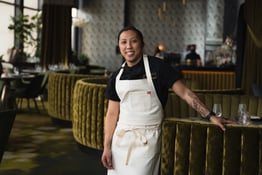Born and raised in Los Angeles, Chef D. Brandon Walker experienced what he called a “rough and tumble upbringing” after his father passed away when was just eight years old. Following brief stints in jail as a young adult, he found a passion for the kitchen and the structure that came with it. He would soon work alongside a range of celebrated chefs including Ludo Lefebvre and Sherry Yard, among others.
Walker has gone on to open his own restaurants, starting with The Mar Vista and its spinoff location, MV Grab and Go. Walker's latest venture, The Art Room, opened in April of 2022 and pairs a fast-casual restaurant with a 2,500-square-foot art gallery.
Building Restaurant Work Culture Informed By Life Experience
Before Walker started bringing his own restaurant concepts to life, he spent a decade running the culinary program at St. Joseph’s Center. The experience involved teaching culinary skills to people from a diverse range of backgrounds and fundamentally changed Walker’s outlook on the restaurant industry.
Walker’s MV Grab and Go concept is currently staffed by many former students from the St. Joseph’s Center. He brought some of those employees with him to The Art Room, while partnering with other local social service organizations to fill out the restaurant’s staff. As a longtime streets-to-employment advocate, Walker thinks the industry as a whole could benefit from changing up its traditional labor model. For Walker, this extends far beyond updating hiring processes. With policies like universal tipping and six-hour work days, Walker is on a mission to create a more equitable, collaborative workplace.
Walker spoke to the Back of House team in anticipation of The Art Room’s grand opening. We discussed more of Walker’s career, his unique approach to building restaurant work culture, and his advice for operators hoping to overcome the industry’s ongoing staffing shortages.
Changing Restaurant Culture with Equity and Opportunity
“The restaurant industry could take a good, long look at some of its more toxic management practices,” Walker argued.“Like the low pay, long hours, the management style that seems to be more critical than supportive and uplifting.”
By Walker’s estimation, the results of that “good, long look” should be a commitment to driving out inequity and transforming workplace culture.
“When there’s inequity in the house,” he said, restaurant operators are “doomed.” Perhaps his number-one rule for changing restaurant culture for the better is instilling the value of a group mentality.
At The Art Room, “everybody does everything.” From whipping up dishes to washing dishes, no task is too big or small for any member of the staff. “If you aren’t willing to make a taco, pour a cappuccino, run a POS, and wash pots and pans,” Walker warned, “we don't want you to work for us.”
A New Approach
Walker acknowledges that this arrangement can take some getting used to. A number of folks quit in 2019 when he first introduced the policies he’s now known for. Front of house employees, in particular, sometimes reject a flattened pay structure. In many instances, they’re accustomed to making “three or four times” more than other co-workers while avoiding certain back-of-house tasks.
Seeing some employees reject “humbling, unifying” experiences like washing dishes together taught Walker to start searching for a different kind of employee. Many of these candidates lacked previous restaurant experience altogether.
“Maybe I don't want the person who's been working in the industry for the last 15 years,” Walker mused after adopting this new philosophy. Instead, he started paying particular attention to candidates who were both “eager to get in at the bottom” and seriously looking “to take on more responsibility and move into management.” What proved most important of all was identifying applicants without “preconceived notions” about how things typically work in the restaurant industry.
The Benefits of Disrupting the Labor Model
Once everyone buys in, it tends to pay off in big ways. When the entire team commits to building restaurant work culture with a group mentality, Chef Walker said, “everybody’s going to make more money, and you’re going to have shorter shifts, greater accountability, a better team, and a better work life.” Walker believes these changes have positive effects for individual operators that are ultimately felt industry wide.
“That’s really the key,” said Walker, “When people feel like they're a team and that they're all on the same level.”
He credits that mentality with helping him retain team members not just from year to year but from restaurant to restaurant. “And that’s worth its weight in gold in this industry,” he remarked.
What does he see as the main benefits of this kind of approach?
1. Learning Not to Pass Judgment
Walker has enforced the value of teamwork and an equitable group dynamic since his days managing the St. Joseph’s Center culinary program. “I ran that program for 10 years,” he recalled. “I created the curriculum for it, and graduated over 1,200 students with 70% retention.”
Walker’s students took part in an eight-week training program and externship. They came, as Walker put it, “from all different walks of life.” Some were homeless or had experienced homelessness in the past. Others were transitioning out of prisons or rehab facilities. For many of them, restaurant work represented a second chance much the same way it had for Walker years before.
“It was really a godsend,” Walker says of the kitchen. “I was kind of lost in my early 20s,” he remembers, ”searching for direction and structure.” He found that in restaurants.
“The accountability, the hierarchy, the structure of it all,” he said, “really played an important role in my life and my development.” At St. Joseph’s and at his restaurants, Walker has looked for opportunities to help more and more people see the benefits of careers in the restaurant industry.
2. Building Restaurant Work Culture & Building Partnerships That Last
Walker’s experience at St. Joseph’s not only introduced him to a new way to approach building restaurant staff but also introduced him to many longtime co-workers. Nine students joined Walker when opened Mar Vista. When Walker opened his second concept, The Mar Vista Grab and Go, he “continued to hire on more folks of similar backgrounds.”
A commitment to equity and continuous improvement have encouraged Walker’s students to become his peers. Together, they’ve adopted a philosophy that Walker suggests is like Kaizen, a central component of lean manufacturing processes. For Walker and his team it means, “working as a collective, addressing problems as a group, fostering a group dynamic, and holding everybody accountable.”
3. Invest in People, Invest in Your Business
“When you invest in your people,” Walker said, “you’re also investing in your business.” Putting that into practice means changing everything from the way you hire to the way you develop talent over time.
4. Beat the Staffing Crisis By Taking Chances...and Offering Second Chances
Walker described the restaurant industry’s current staffing crisis as, “the most pronounced it’s ever been in [his] lifetime.” How should operators respond? The LA-based chef suggests taking a chance on applicants without restaurant experience.
“I’ve seen some pretty desperate measures over the last couple years,” he said. Rather than following suit and trying to entice experienced hires with hefty signing bonuses, Walker encourages operators to invest that money in bringing new, less experienced hires on board and up to speed. He asked, “why not take a chance?” If you’re committed to spending a certain amount of money, you have nothing to lose in investing it in a hungry first-time industry professional.
“I really feel like these are these two groups that might need each other,” he said, “I'm talking about our vulnerable, disenfranchised, previously unemployed folks that have been facing some challenges in their life.” People who have faced personal and professional challenges, Walker contends, could be the perfect candidates to address the many challenges facing the hospitality sector.
5. Transform Your Restaurant's Pay Structure & Schedule Policy
Along with equality in work duties, Walker insists on a fair pay structure for his restaurants. Everybody does the same work and everybody makes the same tips. “The old way,” he said, “people that worked the front of the house were making all those tips, and maybe you’d tip out the back of the house or the runners 10-percent.” He calls the decision to reject this structure an “epiphany,” and promises, “we’re never going back.”
Since late 2018, Los Angeles County has guaranteed a $15 minimum wage, much higher than the $7.25 national minimum, a figure Walker calls “appalling.” With universal tips, Walker reports that workers take home an extra “$3 to $4 hour.” With more than $20 an income on average, they’re all making a living wage. “I”m very proud of that,” he said.
Walker holds that the universal tip system saves restaurants money while his six-hour work schedule policy makes for more efficiency, better profitability, and boosted morale. In addition to helping Walker build great teams, he believes the policies can help the restaurant industry shake some misconceptions about unsustainable hours and workloads. “It’s always been known as this burnout career,” said Walker, “and I don’t think that has to be the case.”
Provide the Right Opportunities for Change
Walker strives to provide everyone with experience in every role and encourages operators to do the same. “If there's willingness,” he advises, “keep training. You have to keep training your staff.” Let back of house veterans interact with people, answer phones, and try out POS solutions. He wants remind operators that a lot of people are looking for new experiences “and don’t want to be pigeonholed.”
In addition to second chances, Walker is committed to offering people first chances, opportunities to transition into restaurant industry roles that may have been closed off to them in the past. “People of color and minorities have been underrepresented in the management level of the restaurant industry,” he notes. He aims for the restaurant industry to offer career paths rather than simply “temporary landing spots.”
“Take care of your people,” Walker concluded, “that's really my greatest advice.”
Written with help from Grace Dickinson.





